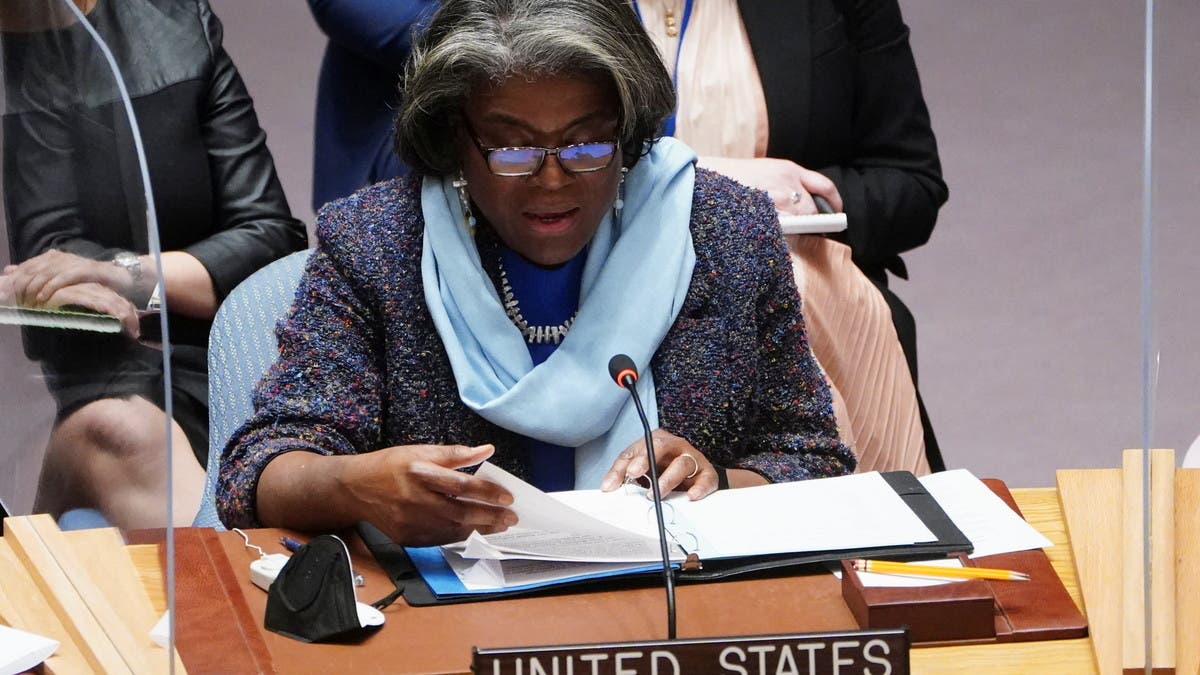The US warned Russia was using a UN Security Council meeting to spread disinformation about its conduct in the war in Ukraine and said Moscow may be planning to use chemical or biological weapons as the conflict continues into its third week.
“We believe Russia could use chemical or biological agents for assassinations, as part of a staged or false flag incident, or to support tactical military operations,” Ambassador to the United Nations Linda Thomas-Greenfield said Friday at the Security Council meeting called by Russia.
For the latest headlines, follow our Google News channel online or via the app.
Russia requested the emergency meeting to discuss its claims that Ukraine had an active bioweapons and chemical weapons program supported by the US and sought to blunt criticism it has faced for days that its allegations are false.
“Western colleagues are going to be saying now that all of this information is fake and Russian propaganda,” Russia’s UN Ambassador Vassily Nebenzia said. “But this is self-delusion.”
UN officials said they have no evidence of such facilities and Thomas-Greenfield said the US has long supported legitimate medical research to help officials counter disease outbreaks.
“These facilities make it possible to detect and diagnose diseases like COVID-19, which benefit us all,” Thomas-Greenfield said.
“The United States has assisted Ukraine to do this safely and securely. This is work that has been done proudly, clearly, and out in the open.”
American and European officials could have rallied to oppose the Russian request for the hearing, but they signaled their view that it was better to go forward to have more public debate.
Russia’s critics said it was trying to turn the tables on an international body where it was largely isolated in the weeks leading up to the war and to use the symbolic forum of the UN Security Council to promote unsubstantiated claims.
“The Council should not be served with fantasies or starry-eyed stories but with proof, independently-verified and corroborated,” Albania’s UN ambassador, Ferit Hoxha, said. “This is not the case.”
China provided some support for Russia’s claims and said they should be properly addressed. And the country’s ambassador, Zhang Jun, rejected US charges that Beijing spreads disinformation.
He countered with criticism that the US maintains or supports biological research institutions around the world. And he called for diplomatic efforts between Moscow and Kyiv to accelerate.
“What is most needed now continues to be to intensify diplomatic efforts, reduce tension and bring the Ukrainian issue back to the track of a political settlement as soon as possible,” Zhang said.
Thomas-Greenfield didn’t cite specific evidence to back up her claim that Russia may be preparing a false-flag event that would be a pretext to the use of chemical or biological weapons.
But she cited Russia’s support for Syrian President Bashar al-Assad, who has repeatedly used chemical weapons; it’s alleged poisoning of dissidents abroad; and said the accuracy of American intelligence in the lead up to the war provided support for the US claim.
“From the beginning, our strategy to counter Russia’s tactics has been to share what we know with the world transparently,” Thomas-Greenfield said. “And candidly, we have been right more often than we’d like.”
Russia rejects charges it poisons dissidents and has called Ukraine and NATO the aggressors in the Ukraine war.
Responding to the criticism from other envoys, Russia’s Nebenzia took the microphone again to dispute charges a maternity hospital in Mariupol was damaged by a Russian missile strike, calling the event fake news and saying Ukrainians mined their own hospital to make Moscow look bad.
“We’re not going to give more air time to the lies you’re hearing here,” Thomas-Greenfield said in response.
Read more:
UN to hold more meetings this week on Ukraine war
Ukraine base near Polish border bombed
Russians strike near Kyiv, block aid convoy; port city reels

 World3 years ago
World3 years ago
 World3 years ago
World3 years ago
 Business1 year ago
Business1 year ago
 Entertainment7 years ago
Entertainment7 years ago
 World7 years ago
World7 years ago
 Entertainment7 years ago
Entertainment7 years ago






